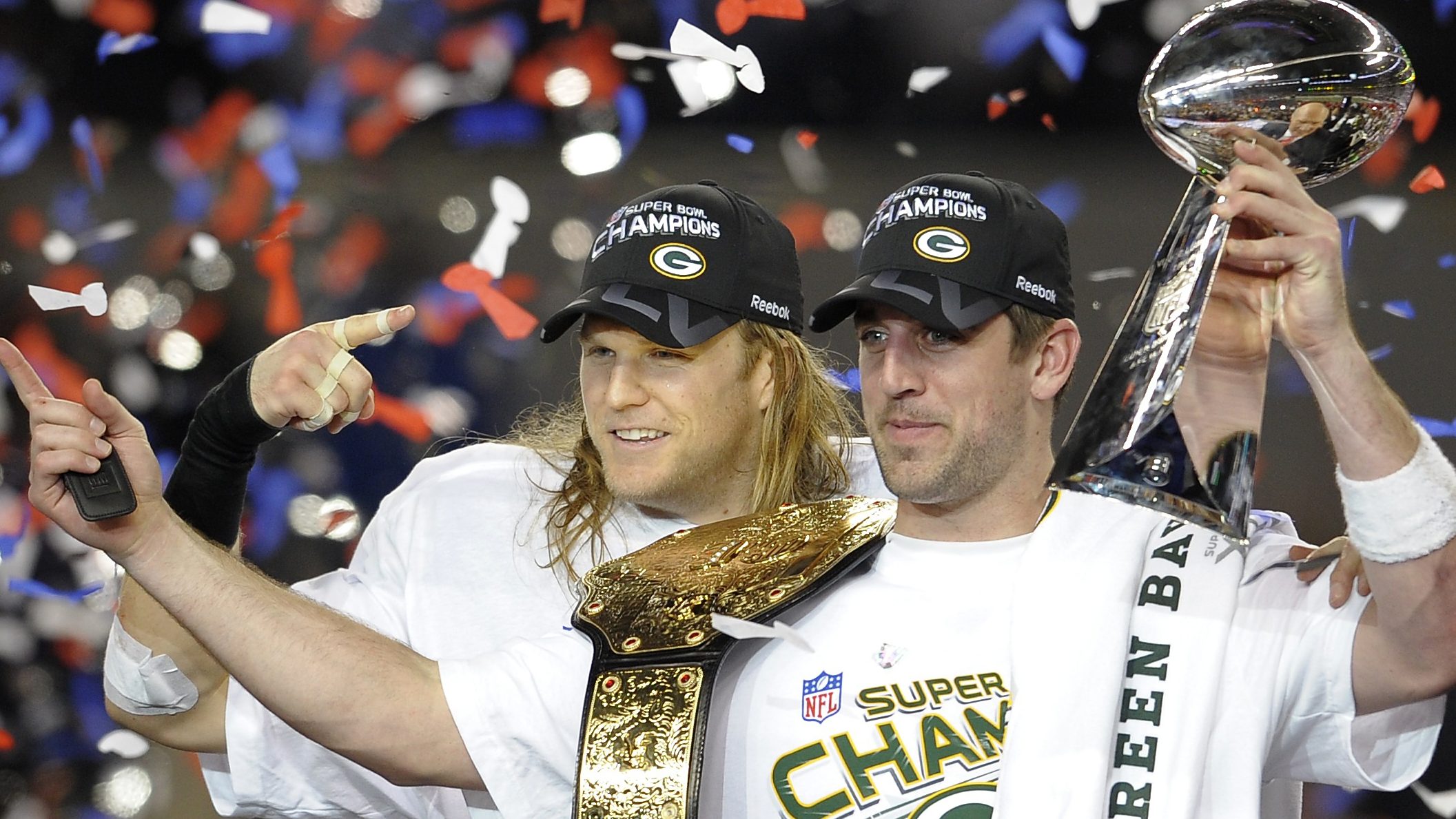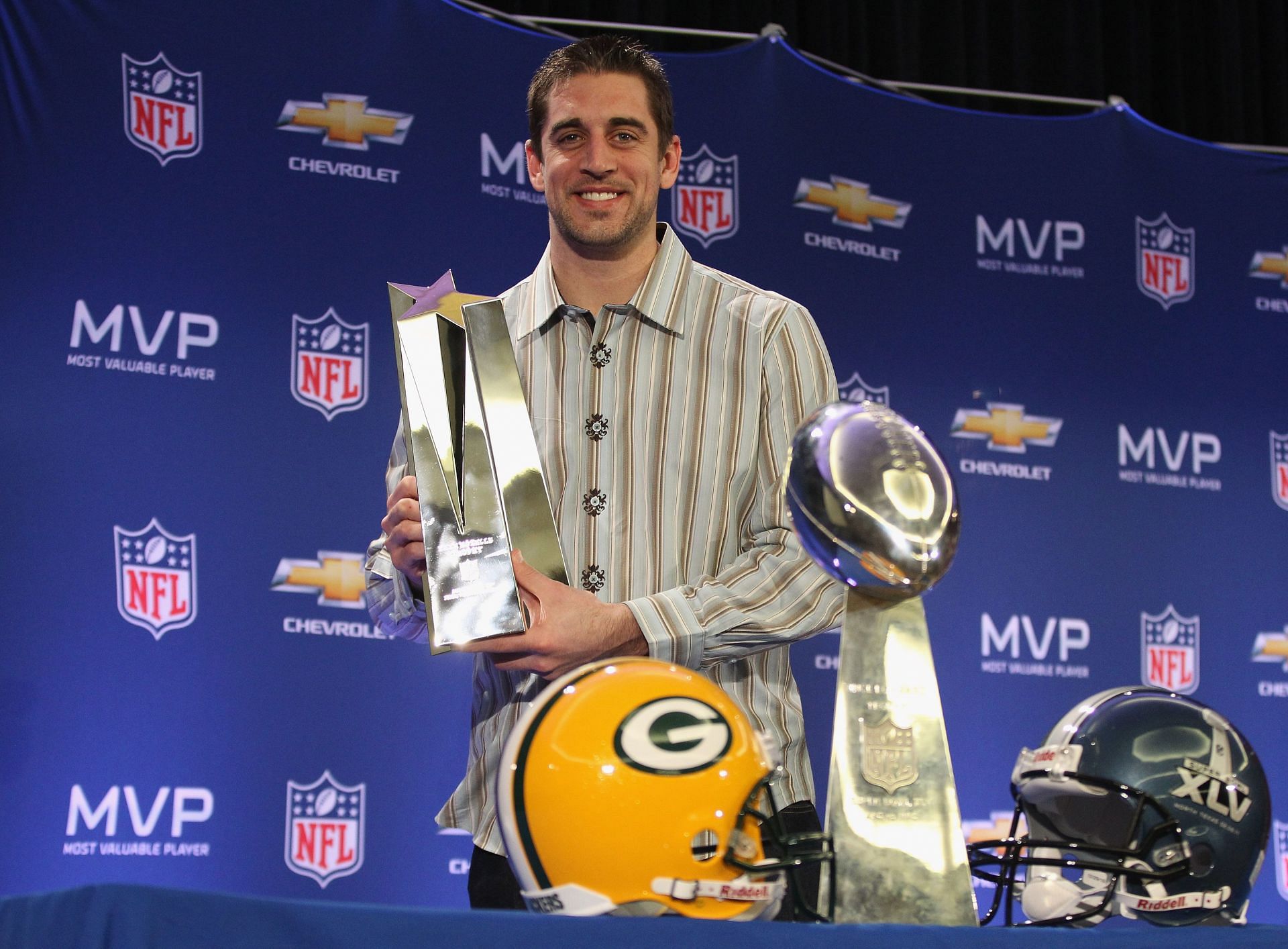Aaron Rodgers Super Bowl Wins: A Quick Guide
Did Aaron Rodgers achieve the pinnacle of success in the NFL? The answer, though seemingly simple, unveils a story of exceptional talent, unwavering determination, and ultimately, a career that saw him lift the Lombardi Trophy only once. This single Super Bowl victory, however, overshadows his many other accomplishments, illustrating the often-unpredictable nature of professional football where individual brilliance doesn't always translate into team championships.
The pursuit of a Super Bowl ring, the ultimate goal for any NFL player, is a complex and often frustrating endeavor. It demands not only individual excellence but also a confluence of factors: a strong supporting cast, effective coaching, strategic game planning, and, perhaps most importantly, a touch of luck. For Aaron Rodgers, the journey to the Super Bowl was marked by both triumph and disappointment, leaving fans and analysts alike to ponder what might have been. His singular championship, though a highlight of his career, adds a layer of complexity to his legacy, prompting questions about what more he could have accomplished and why more titles eluded him despite his extraordinary talent.
| Category | Details |
|---|---|
| Full Name | Aaron Charles Rodgers |
| Date of Birth | December 2, 1983 |
| Place of Birth | Chico, California, USA |
| Height | 6 ft 2 in (1.88 m) |
| Weight | 225 lb (102 kg) |
| College | University of California, Berkeley |
| NFL Draft | 2005, Round 1, Pick 24 (Green Bay Packers) |
| Position | Quarterback |
| Current Team | New York Jets |
| Super Bowl Wins | 1 (Super Bowl XLV) |
| Super Bowl Appearances | 1 |
| NFL MVP Awards | 4 (2011, 2014, 2020, 2021) |
| Notable Awards | Super Bowl XLV MVP, Pro Bowl Selections (10), All-Pro Selections (3) |
| Career Stats (Through 2023 Season) | 475 Touchdown Passes, 59,322 Passing Yards, 65.3% Completion Percentage, 105.0 Career Passer Rating |
| Reference | NFL.com Player Profile |
Aaron Rodgers's Super Bowl journey began in the 2010 NFL season. The Green Bay Packers, led by Rodgers at quarterback, entered the playoffs as a wild card team. Their road to the Super Bowl was a testament to Rodgers's exceptional performance and the team's resilience. They defeated the Philadelphia Eagles in the Wild Card round, then dispatched the Atlanta Falcons on the road, before winning a hard-fought game against the Chicago Bears in the NFC Championship Game. This victory secured their place in Super Bowl XLV.
Super Bowl XLV, played on February 6, 2011, pitted the Green Bay Packers against the Pittsburgh Steelers. The game was a thrilling contest, filled with momentum swings and dramatic plays. Rodgers delivered a masterful performance, completing 24 of 39 passes for 304 yards and 3 touchdowns. His poise under pressure, his ability to make accurate throws, and his leadership skills were all on full display. The Packers ultimately emerged victorious with a score of 31-25, and Rodgers was named the Super Bowl MVP, a well-deserved recognition of his stellar performance.
The victory in Super Bowl XLV marked the high point of Rodgers's career. It was the culmination of years of hard work, dedication, and the unwavering belief in his abilities. The win also served as validation of his skills and abilities, silencing any remaining doubters. The game was a showcase of Rodgers's talent, his ability to read defenses, and his precise passes. He orchestrated the Packers' offense with remarkable efficiency, demonstrating his capacity to lead the team to victory on the biggest stage.
Despite this individual success, the Packers never returned to the Super Bowl during Rodgers' tenure. Several factors contributed to this, including the competitive nature of the NFC, with teams such as the Seattle Seahawks and the San Francisco 49ers emerging as dominant forces. Injuries to key players, coaching changes, and occasional postseason struggles all played their role. Furthermore, the unpredictable nature of the playoffs often meant that even the most talented teams could fall short of the ultimate goal.
The seasons following Super Bowl XLV saw the Packers consistently contend for playoff berths, but they often fell short of reaching the Super Bowl. The Packers' offense, guided by Rodgers, remained potent, consistently ranking among the league's best. However, the team faced challenges from division rivals, and also encountered a multitude of injuries that hampered their championship aspirations. Near misses and playoff heartbreaks became a recurring theme.
In 2014, Rodgers won his second NFL MVP award, a further testament to his individual brilliance. However, the Packers' playoff run that year was cut short by the Seattle Seahawks in a dramatic NFC Championship game, a game defined by an extraordinary comeback by Seattle. This loss epitomized the fragility of success in the NFL, demonstrating how even the most gifted players are often at the mercy of circumstances and their opponents' resilience.
Rodgers's later years with the Packers were marked by continued individual success, including two more MVP awards in 2020 and 2021. However, the teams playoff performances remained inconsistent, and they often faced challenges in the NFC Championship game or in the divisional round. The team struggled to maintain the consistently high level of performance needed to compete for championships, and roster changes made maintaining momentum more difficult.
The Green Bay Packers' offensive scheme, particularly in the Rodgers era, was predicated on his ability to make exceptional throws and read defenses. He was known for his ability to extend plays, his accuracy, and his deep ball prowess. The teams success was often tied to Rodgers's ability to remain healthy and play at a high level. The team's approach to the draft and free agency was also crucial to maintain a competitive roster.
The influence of coaching staff also had a significant impact on the team's achievements. The selection of coaches that can work in tandem with the quarterback, adapt to the times, and cultivate a healthy team environment is a huge requirement. The dynamic between Rodgers and his head coach, Mike McCarthy for much of his Packers tenure, was important to the team's accomplishments and the quarterback's growth.
The supporting cast played a vital role in the teams on-field results. The Packers often relied on a solid offensive line to give Rodgers time to throw, talented receivers to catch passes, and a competent running game to balance the offense. The team also needed strong defensive players to restrict opposing offenses. The chemistry and health of the entire team was vital, with the players being ready to take up the opportunity.
The unpredictable elements of the NFL, such as injuries, and the challenges of playing in cold weather, can also heavily affect a team's prospects. Even the most talented teams can face unexpected setbacks and underperform in the postseason. The combination of skill, coaching, and luck is very important for a Super Bowl-winning team. Several moments of luck and timing are needed for a team to achieve its goal.
In 2023, Rodgers was traded to the New York Jets, marking a new chapter in his career. While the Jets were hoping to contend for a Super Bowl with Rodgers, injuries hindered the quarterbacks ability to contribute. The season was ultimately disappointing for both the Jets and Rodgers. The move raised new questions about his legacy, and about whether he would ever have the opportunity to add to his Super Bowl ring total.
Aaron Rodgers's NFL career provides a clear example of how individual achievements do not always result in team-wide success. His legacy is defined by outstanding passing statistics, an amazing collection of individual accolades, and one Super Bowl victory. His career, marked by individual excellence and the highs and lows of team sport, serves as a reminder that professional football is a team sport where championship glory requires a confluence of factors. It's a narrative that emphasizes the importance of talent, leadership, teamwork, and the always-present role of fate.
Rodgers's focus on continuous improvement was key to his long-term success. His dedication to training, his ability to learn from mistakes, and his commitment to the game were all vital. His passion for the sport was also reflected in his playing style and his influence on his teammates.
Aaron Rodgers's career, while limited to one Super Bowl victory, will always be remembered for its captivating play, individual achievements, and dramatic moments. His impact on the NFL will certainly be felt in the years to come, even if he is not able to secure another Super Bowl ring.



